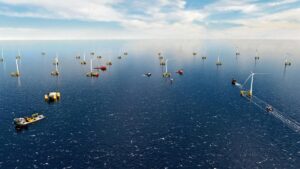Crown Estate floats plans for Celtic Sea wind farms

Floating wind farms big enough to power almost four million homes could be built in the Celtic Sea under plans set out by the Crown Estate.
The organisation, responsible for managing the seabed around England and Wales on behalf of the Queen, said that it intended to award leases by the end of 2023 for four gigawatts of floating wind farms. The first could be generating electricity before the end of this decade.
Floating wind technology is in its infancy, with only a handful of small-scale projects in operation, including two off Scotland. However, it is seen as an important solution to harness wind power in areas where the sea is too deep to install turbines with conventional foundations. The government wants 1GW of floating wind generation operating in UK waters by 2030, up from 80 megawatts today.
The leasing round would give rise to the first projects of commercial scale off England and Wales, with locations to be determined through consultation. Three smaller projects are being assessed for the Celtic Sea and companies have submitted bids for larger projects off Scotland.
Huub den Rooijen, Crown Estate managing director of marine, said that the Celtic Sea was “eminently suitable for floating wind because it is deep”. He said that the Crown Estate would ensure the development of a UK supply chain for floating wind, after criticism of the low share of offshore wind manufacturing in Britain. “We have learnt that you need to invest early on in industrial capability for these industries to compete successfully,” he said.
Leases would be awarded based on “broad value creation, including social and environmental value”, he said, not simply to the highest bidders, as they were in an auction in February that was criticised for fuelling cost inflation while bolstering the Crown Estate’s revenues.
Den Rooijen said that a floating wind turbine could comprise a 200m-diameter rotor atop a 150m tower and that “each of those foundations is an ocean-going vessel anchored on location on seabed”. A UK supply chain was particularly important since such floating turbines could otherwise “be towed in from other locations”.
The Crown Estate said it would work with National Grid on a co-ordinated approach, such as projects sharing power cables to shore, to try to avoid running into opposition in areas such as Cornwall, Devon and Wales.




